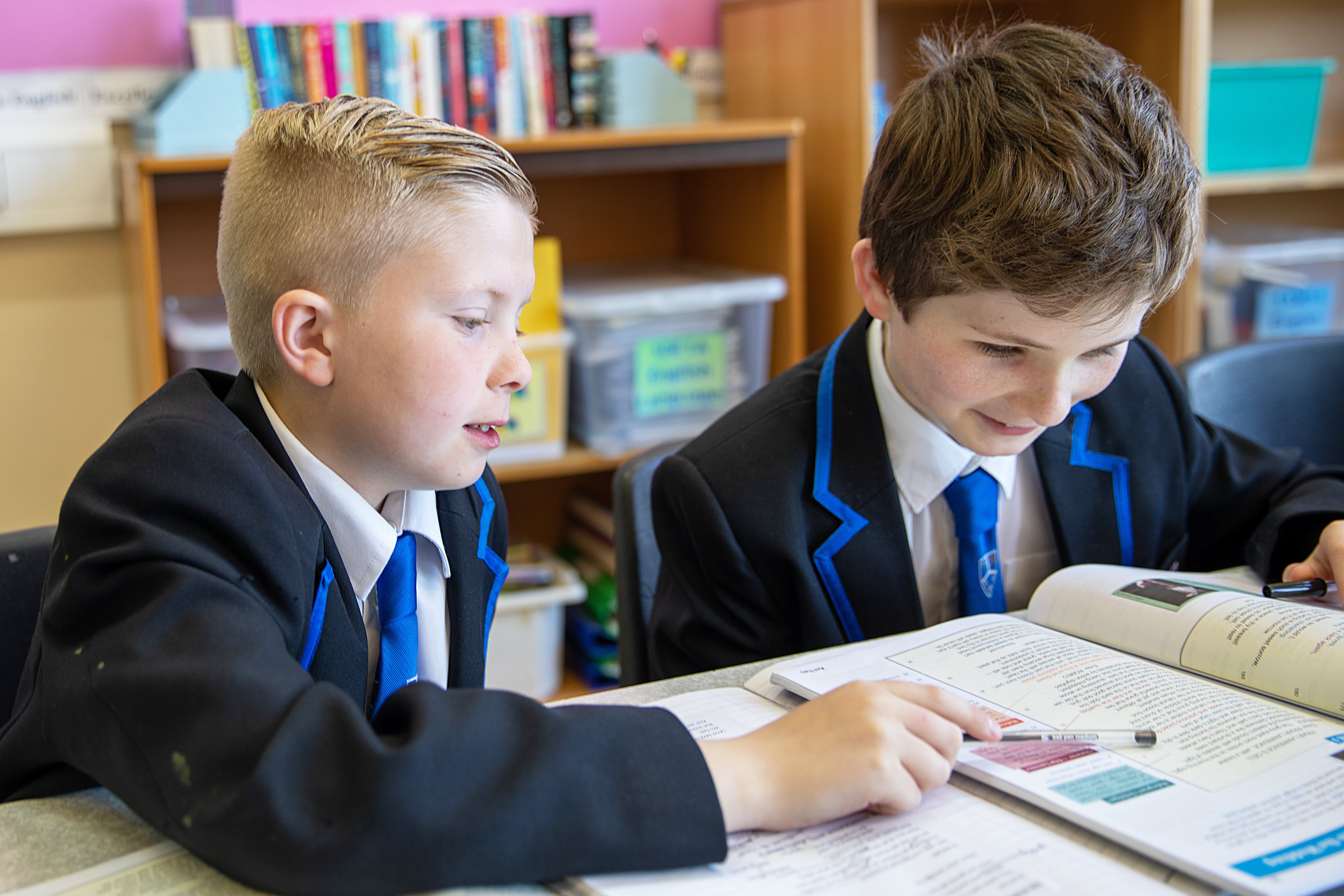- School Info
- Parents & Carers
- Term Dates and School Calendar
- The School Day
- School Uniform
- Mobile Phone and Portable Music Players in School
- Attendance
- Class Charts for Parents
- Homework
- Admissions
- Essential 8 - Ready to learn
- Handbooks for Parents & Pupils
- Letters Home
- Lunch Menu
- Newsletters
- Online Advice (E-Safety)
- Parent View
- Safeguarding
- Personal Development
- Work Experience
- Year 7 Parent Event
- Progress Reports
- Cost of Living Support
- Hillside Pantry
- Team Around The School
- Curriculum
- Pupils
- Calendar
- News
- Contact
- Statutory Policies
- Job Vacancies
- Train to teach
- Home
- Curriculum
- Subjects
- History
History

Strategic Intent for History Department
To develop a curriculum which:
- Sequences historical themes and key concepts in lessons to build on pupil’s prior knowledge and skills. In Year 7 this begins with developing skills of source evaluation and making judgements to build on skills acquired at Key Stage 2.The scheme of learning makes links to the world around us and to current affairs. Pupils will see the relevance of historical study by making these links to the present. Pupils will gain a developed understanding of how we learn from the past to develop our understanding of the present and our systems of government etc.
- Links with the present day so that pupils are able to build on prior knowledge to develop understanding of historical themes such as the political and religious changes that have taken place from 1066 to the present day.The development our of society and culture, changes to crime and punishment, health and science and industry.
- The history of our locality will support the content of lessons.Throughout the scheme of learning teachers’ will make specific references to local history at every available opportunity.The scheme of learning will develop a sense of community by looking at how people lived and will help pupils to understand the second order concept of change, continuity, cause, consequence, importance, significance, similarities and differences.
- Ensure that complex, subject specific vocabulary is introduced throughout.The use of accurate vocabulary is embedded in lessons and pupils are encouraged to use correct historical terms to show developed contextual knowledge.The use of tier 2 words is encouraged to develop contextual understanding and the quality of pupils’ written work.
- Has retrieval practice embedded through a variety of assessment for learning strategies.Pupils are encouraged to build on prior learning to make links between events and how this has led to change.
- Has feedback embedded in a variety of ways including whole class feedback, peer and self-assessment using mark schemes in pupil friendly language, live feedback in the classroom and teacher assessed feedback of longer pieces of writing.The variety of feedback means that pupils can build on knowledge and skills to enhance learning.
- Emphasises rights and responsibilities in terms of the law and ethics.Pupils will understand the legal, moral ethical implications of historical decisions.The history curriculum will give pupils a political knowledge and awareness, they understand how politics has developed over time.
Curriculum Principles
- We prioritise depth of knowledge. The development of broad historical skills will give pupils a deep knowledge and understanding of historical concepts. Learning pathways will focus on understanding how the past impacts the present and will have a thematic approach that may at times deviate from chronology to develop a deep understanding of historical ideas and concepts.
- There are high expectations of literacy in all lessons.Teachers model Standard English in written and spoken form.Pupils are given opportunities to write at length in a creative and structured form, utilising skills developed in English to express historical ideas and concepts.
- When opportunities arise for numeracy skill development within the history curriculum teachers will support pupils e.g. timelines, chronology and statistics.
- Pupils will be given the opportunity to make links to local history throughout the curriculum.Pupils will develop an understanding of their local history and will be proud of Merseyside’s place in world history.Pupils will be given the opportunity to visit sites of local historical interest to develop an understanding of local as well as national and international history.
- Pupils will be given the opportunity to express their historical knowledge in a creative form to use skills learnt in other subject areas to develop their historical understanding.The study of art history and political cartoons are an important feature of history lessons and is studied across both key stages.Introducing this builds on pupil’s cultural capital.
- Links will be made to current affairs, and the implications that decisions made in the past have on us today.
- Pupils will be able to look at cultural differences and have a clear understanding of diversity and why Britain is a multi-cultural society as a result of past events.
- Pupils will study diversity in many different settings and look at how campaigns have brought about change throughout history and peoples acceptance of the different types pf diversity.
- Pupils will make links between historical skills and the skills of different careers e.g. significance and medicine, research and journalism.Personal Development is embedded throughout the curriculum pupils are encouraged to reflect on the social and moral implications of historical events.
- Support is given to allow those working below their chronological age to enable them to develop literacy skills in history.
- Reading tasks are embedded in the curriculum for example, guided reading of academic texts, encouraging reading for pleasure of historical fiction, skimming and scanning of sources and interpretations.Pupils are encouraged to read aloud, silently and in pairs to develop historical and literacy skills.
- Pupils are encouraged writing fluently and communicate in a variety of written mediums.
- We use opportunities for cross-curricular work to develop transferable skills and to allow pupils to see the links across a range of areas.Working closely with RS, Geography, English, and Business Studies for example to make cross curricular links.
Course Content
Key Stage 3 Pathways:
Year 7 Term 1 Historical Skills including: chronology and timelines, sources and interpretations, second order concepts and propaganda. Ancient Civilizations and Empires: The Byzantine Empire, Church State and Society: The Norman Conquest, how William controlled England.
Year 7 Term 2 Church, State and Society: the medieval church, religion and life in medieval times and the Tudors including the reigns of Henry VIII, Edward VI and Mary I.
Year 7 Term 3 Church State and Society: Elizabethan England and The Stuarts including the English Civil War.
Year 8 Term 1 Historical Skills recap including: chronology and timelines, sources and interpretations, second order concepts and propaganda. Political Ideas, Industry and Empire: The Industrial Revolution and the extension of the Franchise.
Year 8 Term 2 Political Ideas, Industry and Empire: Africa, India and the Trans-Atlantic Slave Trade. Including case studies on Africa and India under colonial rule and the consequences of political ideas and empire.
Year 8 Term 3 Challenges for Britain, Europe and the Wider World: Women and the Vote, the causes and consequences of the First World War.
Year 9 Term 1 Historical Skills recap including: chronology and timelines, sources and interpretations, second order concepts and propaganda. Challenges for Britain, Europe and the Wider World: Depth Study: The American West cultural differences and changes. European politics: Democracy and Dictatorship; Communism and Fascism. Challenges for Britain, Europe and the Wider World: Depth Study: Germany
Year 9 Term 2 Challenges for Britain, Europe and the Wider World: Case study on the Holocaust including the ghettos, concentration and death camps. Challenges for Britain, Europe and the Wider World.
Year 9 Term 3Challenges for Britain, Europe and the Wider World: Case Study: The Cold War including the Korean War, Cuban Missile Crisis and the Vietnam War. Thematic Study: campaigns for change including: Civil Rights Movement, Women’s Liberation, Stonewall, Black Lives Matter and disability rights acts.
Key Stage 4 Pathways:
Year 10 Term 1AQA GCSE Paper 1 America 1920- 1973 – American people and the ‘Boom’, and Bust- American’s experience of the depression and the New Deal.
Year 10 Term 2AQA GCSE Paper 1 America 1920-1973- Post War America. AQA GCSE Paper 1 – Conflict and
Tension the First World War 1894-1918. Causes of World War One.
Year 10 Term 3 Paper 2 – Elizabethan England 1568-1603
Year 11 Paper 1 Paper 1 Conflict and Tension: The First World War. The end of the war.
AQA GCSE Paper 1 America 1920-1973. Opportunity and inequality. American people and the ‘Boom’, and Bust- American’s experience of the depression and the New Deal.
Year 11 Paper 2 AQA GCSE Paper 1 America 1920-1973. Opportunity and inequality. Post War America. AQA GCSE paper 2 British Depth Study: Elizabethan England.
Year 11 Paper 3 AQA GCSE paper 2 British Depth Study: Elizabethan England. Historical Site study (Sheffield House)
Enrichment
The history department provide a range of enrichment opportunities for pupils including opportunities to travel abroad (New York and Battlefields in previous academic years) to enable pupils to put their studies into a real-world context and will be able to understand the cultural sensitivities of past events. Pupils are given the opportunity to build cultural capital by taking part in visits to sites of local historical interest. Within lessons enrichment opportunities are provided in terms of the study of art history, literature and film in a historical context. Teaching staff discuss career opportunities and what qualification in history can lead to. Pupils are also given an understanding of the rigours of A Level and undergraduate study by reading the work of leading historians to support their learning. This is done through ‘reading for meaning’ strategies.
Personal Development, Behaviour and Welfare
In the history department pupil’s social, moral, spiritual and cultural wellbeing is actively supported. All lessons have a Personal Development focus that links to the core content. The nature of the study of history lends itself well to Personal Development and pupils will consider how people work together to bring about change, how society has changed over time and how government decisions effect people. The moral implications of government decisions are considered along with an understanding of law and order, and how the government is run today. Pupil’s spiritual wellbeing is considered as religious changes and the impact of world religions form the basis of large sections of the curriculum. An understanding of changes in British and world culture are also studied in history lessons with case studies on world history, Africa, India, Russia, Germany Vietnam and Cuba and teachers will make comparisons with the present day to deepen understanding. Personal Development is a core component of the history curriculum as it underpins the values of the history department and enables teachers to deepen understanding.
The history department promotes a positive learning environment where pupils feel safe to express their opinions without judgement. Pupils are encouraged to explain their reasoning both verbally and in written form. Mutual respect between pupils and teachers allow pupils to share their ideas in all history lessons. History lessons are structured to promote positive routines that foster an atmosphere of learning. Positive behaviour for learning is praised and phone calls home are made regularly. Pupils respond well to this positive feedback and this further develops a learning environment based on respect and learning. Teachers have high expectations of pupils in terms of behaviour and attitude that are maintained consistently.
The history department communicates the whole school ethos of “excellence in the heart of the community” in all interactions with pupils. The department’s focus is one of excellence in learning so that pupils make the best progress that they are able to.
You can find out more information on the sequencing of our curriculum and what is being studied in each term here:
Parents and pupils will find the following Journey of Knowledge overviews useful as they outline the core content to be learnt in each KS3 unit:
Key Stage Four Journey of Knowledge


